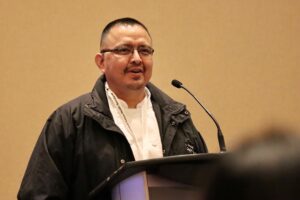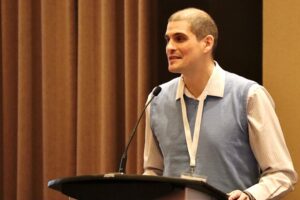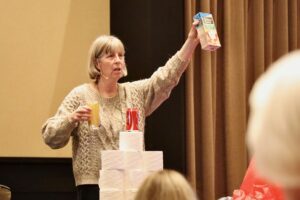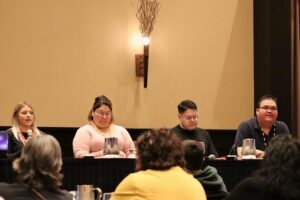Anishinabek Nation hosts its 2nd Annual Diabetes Conference

By Laura Barrios
CHIPPEWAS OF RAMA FIRST NATION — The Anishinabek Nation hosted its 2nd Annual Diabetes Conference—Embracing Diabetes with Knowledge and Care, which kicked off on March 6 and concluded March 7 in Chippewas of Rama First Nation.
Day 1 of the conference, which was geared towards frontline workers who provide care for Indigenous people with diabetes, opened up in a good way with a smudge and prayer led by Nokomis Stephanie Sandy of Chippewas of Rama First Nation.
“The smudge is to cleanse ourselves and to have that good energy we’ll be sharing today…it’s a long battle for people who have diabetes,” expressed Nokomis Sandy. “As one, we are strong people. We are resilient.”
Opening keynote speaker Nephi Craig, Indigenous Chef, explored Indigenous Foods for Health: Trauma, Violence, and Sugar with participants.
“Trauma, violence, and sugar are woven into the fabric of our everyday lives,” he stated, acknowledging that a lot of that trauma stems from colonialism. “Food is a good equalizing force – it is transformative. And when we have access to land, we have access to all the modalities to care for ourselves.”
Craig believes that Indigenous foodways are a form of combating colonialism that is present throughout society on many levels.
“This session illustrates how ethno-poetry is leveraged as a fluid framework for social recovery, wellness, and challenging colonial paradigms,” he expressed. “I want to remind us that food carries memory, and revitalize that food and traditional ecological knowledge are some of the most powerful forms of training.”

Participants also welcomed Ryan Hooey, who is with the Canadian National Institute for the Blind, and his certified guide dog Joe, as he shared his over 30-year journey with diabetes, including his diagnosis of Diabetic Retinopathy, challenges, and achievements.
“Now that I’ve lost my sight, I have to learn to live without sight. The simple things you take for granted have absolutely been incredible to relearn,” he stated regarding the loss of his vision due to Diabetic Retinopathy about 12 years ago. “Diabetes is heavy because it weighs down on your shoulder…I love being a part of this community; I’ve met some incredible people. There’s so much to learn.”
Hooey’s presentation incorporated discussions on Diabetic Retinopathy, a chronic, progressive, sight-threatening disease of the retina which is a complication of having too much sugar in the body. It included a demonstration of how an eye health screening is performed with the help of Stacey Ely and Autumn Watson with the Indigenous Diabetes Health Circle, who also had an Environments and Health Signature Initiative booth set up to do eye health screens for participants of the conference, emphasizing the importance of diabetes management.
“Test your sugar, test your sugar, test your sugar. It’s so important and it changes really rapidly,” he advised as part of diligent diabetes management. “Be a part of your diabetes management team. People can’t help you if you don’t help yourself. It’s hard, but it’s how I’ve managed it… Diabetes is one of the only chronic diseases where you can’t cure it, you have to manage it.”

Karen Graham, Canadian author and registered dietitian best known for her published works on diabetes, presented on Easy Low-Carb Diabetes Meal Planning where she shared recipes on how to make nutritious meals that are also low-carb and ideal for those who are managing their diabetes, tips and suggestions on how to save money and reduce food waste, and visual examples of what is found in foods such as sugar quantity, or portion distortion as she called it.
Graham offered an interactive session where the floor was opened for participants to ask questions, which created opportunities for field workers to share feedback, resources, tips and recommendations, and overall support and encouragement.
The final portion of the day featured a panel comprised of young adults William Trudeau from Aundeck Omni Kaning First Nation, Rebecca Commanda from Serpent River First Nation, Shaelyn Laronde from Nipissing First Nation, and Steve Rickard, from Taykwa Tagomou Nation, with a focus on lived experience with a diabetes diagnosis early in life including diabetes management, education efforts to combat stigma, and the importance of support systems.

“Management is always a struggle and you’re constantly changing your life and going through different things like stress—it’s really a second job,” expressed Laronde on diabetes management; however, she maintains a positive outlook with the help of her support system. “I try to be open and share my experiences with others the best that I can.”
“I approach the health centre when I know I need additional support,” noted Commanda as a way to manage diabetes burnout.
Day 1 of the Diabetes Conference came to a close with participants sharing their feedback on the day’s presentations and Nokomis Sandy sharing a recap of the core messages from the day.


